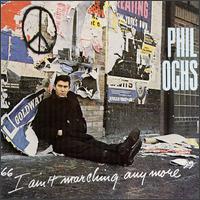I Ain't Marching Anymore
| I Ain't Marching Anymore | ||||
|---|---|---|---|---|
 |
||||
| Studio album by Phil Ochs | ||||
| Released | 1965 | |||
| Recorded | 1964 | |||
| Genre | Folk | |||
| Length | 50:54 | |||
| Label | Elektra | |||
| Producer | Jac Holzman and Paul A. Rothchild | |||
| Phil Ochs chronology | ||||
|
||||
| Professional ratings | |
|---|---|
| Review scores | |
| Source | Rating |
| AllMusic | |
| PItchfork | 8.5/10 |
I Ain't Marching Anymore is Phil Ochs' second LP, released on Elektra Records in 1965.
Dispensing with second guitarist Danny Kalb, Ochs performs alone on twelve original songs, an interpretation of Alfred Noyes' "The Highwayman" set to music (much as Poe's "The Bells" had been set to music on the previous album) and a cover of Ewan MacColl's "The Ballad of the Carpenter".
Of the twelve originals, probably the most noted was the title track, with its distinctive trilling guitar part, that spoke of a soldier sick of fighting. Also of note was the album closer, "Here's to the State of Mississippi", a biting criticism of that state's lack of civil rights and general bigoted attitude. Other important songs include "Draft Dodger Rag" (assailing those "red blooded Americans" who were in favor of US participation in the Vietnam War but did not fight because they were just summertime soldiers and sunshine patriots), "That Was The President" (a tribute to John Kennedy written soon after his assassination), "Talking Birmingham Jam" (which used the traditional talking blues form to assail the racist leaders of Birmingham) and "Links on the Chain" (attacking labor unions for excluding African-Americans and failing to support civil rights).
Ochs showed great thematic versatility on the album, including not just blatantly anti-war or protest songs but also poetry (Alfred Noyes, John Rooney, and Ewan MacColl) and some songs his followers probably didn't want to hear. He noted, for instance, in the liner notes that his Marxist friends couldn't understand why he wrote "That Was the President," dryly adding that that was one of the reasons he wasn't a Marxist. He showed more socialist sympathies with the songs "The Men Behind the Guns" and "Ballad of the Carpenter," with its memorable lyric "Jesus was a working man." (Ochs wrote in the liner notes that "songs like this" were one of the reasons the State Department blocked Ewan MacColl from entering the U.S., adding that this was unwise given "the quality of culture in America.") However, more doctrinaire socialists may have had mixed feelings about "That's What I Want to Hear," in which Ochs tells an out of work man to stop begging and fight for full employment. Among more traditional protest songs, the most pointed might be "Iron Lady," about the death penalty, with the memorable line "And a rich man never died upon the chair." (The "iron lady" in the title referred to the electric chair.) Ochs wrote that "in the future, intelligent men will read in amazement about the murder of Caryl Chessman." But hard hitting songs like that and the title song were softened with sentimental and even romantic songs like "That Was the President" and Noyes' "The Highway Man." And while critical, songs like "Draft Dodger Rag" and "Talking Birmingham Jam" used humor rather than harsh rhetoric to make their points.
...
Wikipedia
